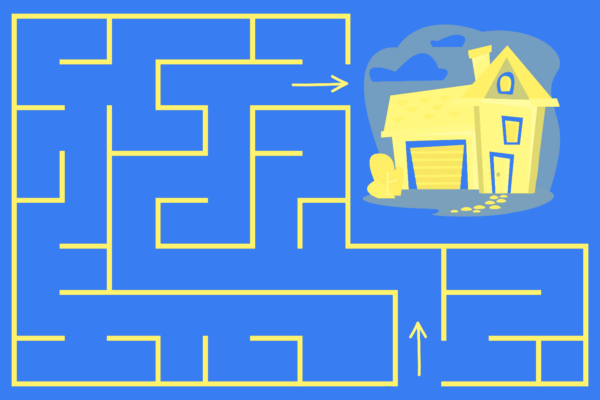
What are FHA Loans?

Exploring your loan options is more than just looking at lenders, interest rates, and closing costs. It’s also about choosing the right type of loan. Yep, that’s right— not all home mortgages are the same.
There are a lot of options out there, from conventional loans to non-conforming jumbo loans to government-backed options like VA and USDA loans. One option you may have heard about is the FHA loan program.
FHA loans, like VA and USDA loans, are backed by the government. This gives this loan product some unique advantages that make it a great option for some— but not necessarily for all. In this article, we’ll look at what an FHA loan is and whether or not it may be for you.
What is an FHA loan?
An FHA loan is a type of home mortgage backed by the Federal Housing Administration and issued by traditional lending institutions like banks or credit unions.
In other words, FHA loans are subsidized by the federal government. If you default on your mortgage, the bank won’t lose out. Instead, the Federal Housing Administration will cover any losses, minimizing the overall risk a bank takes when they lend you money. Because the bank assumes less risk, qualification requirements are less stringent, opening the door for more people hoping to become homeowners.
The program started in 1934 during the Great Depression, a time when it was difficult to qualify for a home loan. Down payments as high as 50% were often required to get financing, making it nearly impossible for many to make the purchase.
Today, the FHA loan program serves the same mission. Each year, the program helps low- and moderate-income families purchase homes and achieve greater financial independence.
FHA or Conventional?
Our local, award-winning lending team is ready to help you begin today.
Pros and Cons of an FHA Loan
Though FHA loans open the doors of homeownership for many, there are still some drawbacks to consider.
| Pros | Cons |
|---|---|
| Lower credit score requirement. Borrowers may need a 620 or higher to qualify for a conventional loan. FHA borrowers can have a score as low as 500 and still qualify with some lenders. | There’s a max amount that you can borrow. In 2022, the maximum amount that a borrower in a low-cost area can borrow is $472,030. In higher-cost areas in Texas like Travis county, the loan limit is $571,550. This may not cover the cost of a home in today’s market, especially in expensive cities. |
| Smaller down payment requirement. With house prices skyrocketing, homebuyers have needed more cash on hand for a down payment than ever before. | The home must be eligible. Sorry, fixer-uppers. To qualify for an FHA loan, your home must meet minimum property standards, meaning your home will be inspected to make sure it’s safe, sound, and functional. The home must also serve as your primary residence. |
| Higher DTIs are accepted. Having too much debt can disqualify you from a conventional mortgage. With an FHA loan, a debt-to-income ratio as high as 43% may be accepted. | You must pay MIP. If you take out an FHA loan, you must also pay an additional mortgage insurance premium. This additional fee can either be paid for upfront at closing or rolled into the loan and paid over time. |
| You can qualify sooner after a bankruptcy or foreclosure. Bankruptcies and foreclosures significantly damage your credit history, making it difficult to borrow money for up to ten years after. The FHA allows borrowers to qualify for a loan within two years of a bankruptcy and three years after a foreclosure. | An FHA loan may make your home offer less attractive. In hot markets, buyers financing with FHA loans may look less attractive than buyers paying with cash or conventional loans. |
FHA Loan Requirements
FHA loans give borrowers who otherwise wouldn’t be able to obtain loan approval the opportunity to finance their homes. Though the criteria are less stringent, there are still requirements that borrowers must meet, including:
- A credit score of at least 580 (Note: Credit scores as low as 500 may be considered with a down payment of at least 10%.)
- A down payment of at least 3.5% of the mortgage amount
- Debt-to-income ratio of 43% or less
- Must provide proof of employment and steady income
These requirements are the minimum standard, but lenders can have more stringent requirements than these. (For example, some lenders require a credit score of 600 or more.) In addition to meeting borrower requirements, the house itself must meet FHA’s Minimum Property Standards related to safety, security, and soundness. Banks verify this with an appraisal from a licensed professional, who is required to submit a Uniform Residential Appraisal Report form.
Who is an FHA loan best for?
The FHA loan may sound like a great option for all homebuyers, but, truthfully, it’s not for everyone. While this loan is open to all homebuyers, many are better off taking out a conventional loan.
FHA loans are best suited for:
- Low- to moderate-income families and individuals
- Those who do not meet conventional loan requirements (low credit score, high DTI, etc.)
- Homebuyers who have limited savings for a down payment or plan to utilize a down payment assistance program
- You are purchasing a home somewhere other than a high-cost area, such as a suburb
A conventional loan is probably a better option for:
- People in fair or good financial standing (credit score of at least 620, lower DTI)
- Those who have savings to put towards a down payment
- Buyers purchasing a home in a higher cost area, such as the city of Austin
Though you’ll hear a lot of talk about FHA loans, they are far from the most popular options. In fact, an overwhelming majority of homebuyers use conventional mortgages to finance their purchase. In 2021, only 10.3% of home mortgages were FHA loans. Of these, 84.73% of FHA borrowers were first-time home buyers.
You may have heard friends or family members recommend FHA loans—and that advice can be very helpful! But there are serious advantages to conventional loans, and those should be considered carefully.
Explore Your Loan Options
Wondering which loan may be right for you? You’ve already taken the right first step by beginning your research on the different types of home mortgages. Continue your search by learning more about the different loans available:
Want to talk to a loan expert? Amplify’s loan officers are always ready to answer questions and help Central Texas homebuyers choose the right loan for their situation.
Ready to get prequalified?
Apply today and start your journey toward your new home.




